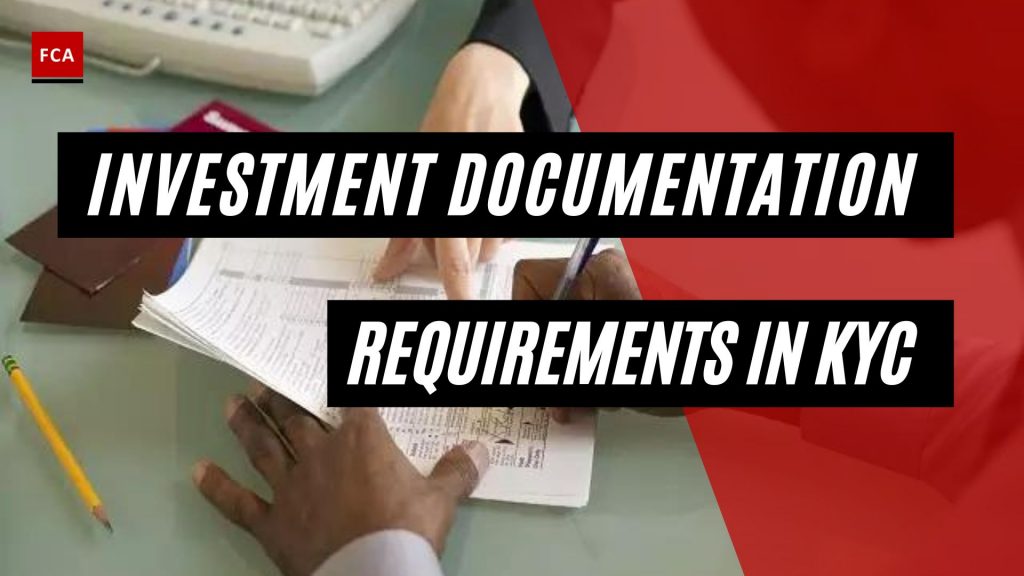Investment documentation requirements. Documentation touches every aspect of investing, from internal documents to contracts with external parties. When an investment manager places an order on behalf of the client or investor, and purchases a share or security, documents are developed to record the purchase or trade. Documentation is important in trading to provide a record of trades, quantity, and execution price.

Investment Documentation Requirements
Documentation is also obtained from the client regarding the investment made, such as consent to buy or sell particular security or share. Investor or client on-boarding is the process by which a broker or investment company accepts a new client and, inputs the details into its records to enable the company to conduct transactions with and on behalf of the client.
Companies in the investment industry usually have a legal obligation to verify the identity of a potential client utilizing a know-your-client (KYC) process before commencing a relationship with the potential client.
The KYC Process
The KYC process requires the client to complete a questionnaire and, provide personal background information, including documentary proof of identity, addresses, and other personal details. The documents are used for screening against various negative databases to ascertain whether a potential investor is appearing in the negative database or not. The document serves as proof of the source of funds of the investor, to verify that the money does not originate from any illegal or criminal source.
Documentation provides evidence of how companies operate, interact internally and externally, and deliver their services. Documentation varies across the investment industry and companies in the investment industry. But the general rules, structure, and logic of internal and external documentation apply to all types of companies. This chapter explains why documentation is important, provides examples of different types of documents, and describes how documents are managed.
Documents
A document is a piece of written, printed, or electronic information that provides evidence as an official record for instance, of the purchase or sale of a share or security. Some documents are for internal use of the brokerage company or investment house, and some are related to the investors or clients. They are generally administrative and reflect a company’s philosophy, approach, and activities. Other documents are for external use. These documents convey information to and from the public domain and often help limit the risks that interaction with the public creates.
When documents are missing, or poorly maintained, then there is room for doubt because documents may be subject to interpretation or undue influence. Proper documentation removes ambiguity between the investor and, the broker.
Brokers
Broker or investment companies constantly monitor the activities and, transactions of the investor or clients to ensure that they are not suspicious. The documentation is maintained in this regard, and in case any suspicious activity is identified, then the broker must report that activity or transaction to the relevant authorities, keeping an appropriate record for reference purposes.

What Are The Documents Required For KYC?
KYC, or know your customer, is a mandatory verification procedure used by financial institutions to reduce illegal activity. Since 2004, the Reserve Bank of India has made it illegal for individuals to open a bank account, trading account, or demat account without first completing the KYC procedure.
The KYC process is required for any type of financial transaction. After completing the KYC verification process, you must provide information about your identity, address, and financial history to the financial institution that conducted the test. This can help the bank know that the money you chose to invest in was not used for illegal purposes.
Why Are KYC Documents Required?
KYC documents, along with the customer’s photograph, have only recently become mandatory due to the prevalence of fraudulent transactions, fraudulent accounts, and money laundering. As a result, banks, other financial institutions, telecom companies, and some government departments require these documents to verify a person’s identity before proceeding with any transaction. Income verification is required to ensure that the source of funds is legitimate.
Why Is KYC Important?
KYC enables bankers to verify that the application and other identity details provided by the client are genuine. Because of instances such as money laundering and siphoning money from bank accounts, verifying an individual’s identity is critical to preventing fraud.
KYC has been in use for many years, and all customers are required to follow KYC regulations. It is not possible to open a bank account without KYC compliance.
Banks, on the other hand, have been using manual KYC, which requires a lot of human effort as well as time. Furthermore, the risk of human error is always present. Errors in such processes could result in a significant financial loss for the institute. Banks must improve their approach to KYC verification.
Final Thoughts
Know Your Customer, or KYC, is a term commonly used in the banking industry to describe the process of verifying a client’s identity when doing business with them. Banking regulations require banks, digital payment service providers, and financial firms to complete a customer’s KYC process before granting them full access to all services.
KYC verification is deemed necessary in order to reduce illegal activities such as money laundering, bribery, and corruption. It aids authorities and businesses in keeping track of customer activity and detecting fraudsters ahead of time. Apart from the legal implications, performing KYC assists businesses in keeping fraudsters out of their systems.









